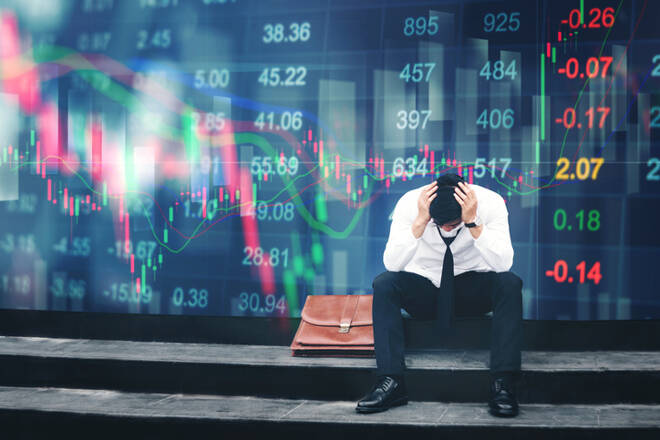Advertisement
Advertisement
Asian Shares Lower as Investors Await China’s Response to Increased Tariffs
By:
White House economic adviser Larry Kudlow said on Sunday that he doesn’t believe China will retaliate against additional tariffs on Chinese imports that President Trump announced Friday.
The major Asia Pacific stock indexes are all in the red on Monday after the trade tensions between the United States and China intensified last week.
On Friday, Beijing unveiled new tariffs on $75 billion of U.S. goods. That move was in response to Trump’s unexpected announcement in early August that the U.S. would impose tariffs on another $300 billion of Chinese goods although he did exempt some products until December 15.
At 06:05 GMT, Japan’s Nikkei 225 Index is at 20259.78, down 451.13 or -2.13%. Hong Kong’s Hang Seng Index is at 25388.73, down 790.60 or -3.02%. South Korea’s KOSPI Index is trading 1917.00, down 31.30 or -1.61%.
In China, the Shanghai Index is at 2860.49, down 36.94 or -1.27% and Australia’s S&P/ASX 200 is at 6414.80, down 108.30 or -1.66%.
Trump then hit China with a countermeasure, tweeting that America will hike tariffs on $250 billion worth of Chinese goods to 30% from 25%. Additionally, tariffs on another $300 billion in Chinese products will also go up to 15% from 10%, Trump said. The levies on the $250 billion worth of goods are scheduled to kick in October 1, while the duties on the $300 billion are set to go into effect in two stages on September 1 and December 15.
Tension to Start the Week
That’s where the two countries stand at the beginning of the week. This back-and-forth escalation indicates how unlikely a trade deal and a de-escalation have become.
The big blow to the markets, which sent the U.S. indexes plunging, was Trump’s order to U.S. firms to “start looking for an alternative to China.”
Although U.S. companies are not likely to act immediately on Trump’s order, the President has created fear and uncertainty. The fear is that Trump might invoke his emergency powers and actually force the companies to leave.
Furthermore, the Chinese government may actually try to punish these companies by forcing them to leave.
Trump Adviser Kudlow Does Not Expect Further Retaliation from China
White House economic adviser Larry Kudlow said on Sunday that he doesn’t believe China will retaliate against additional tariffs on Chinese imports that President Trump announced Friday.
Asked on CBS’ “Face the Nation” if he expects retaliation from China, Kudlow said: “I do not. I think his was an action to respond to their action. So I doubt whether they’re going to take another step. I have not heard their official response yet. We’ll have to wait and see.”
Kudlow also said that the president does have the authority to block private businesses from investing in China, but that “he is not intending to right now. That is not his intention.”
U.S. Treasury Secretary Mnuchin Calls Out Beijing
U.S. Treasury Secretary Steven Mnuchin called out Beijing for unfair trade practices.
“We do not have free trade with them,” Mnuchin said Sunday on the sidelines of the G-7 meeting in France. “It’s a one-way street: They have free entrance into our markets, our investments, our companies and we do not have the same thing there. That’s the only reason why we are in this situation with China. If China would agree to a fair and balanced relationship, we would sign that deal in a second,” he added.
About the Author
James Hyerczykauthor
James Hyerczyk is a U.S. based seasoned technical analyst and educator with over 40 years of experience in market analysis and trading, specializing in chart patterns and price movement. He is the author of two books on technical analysis and has a background in both futures and stock markets.
Advertisement
